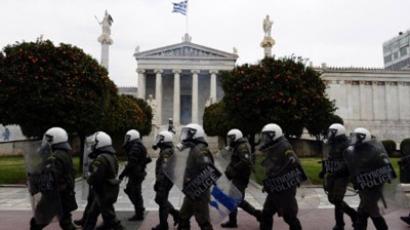Greece the ‘first domino’ in end of EU nations’ financial sovereignty?
Greek political party leaders have assured Brussels that they will stick to an agreed-upon austerity program following elections in April. But some experts say Greece is ill-advised in bending over backwards to secure the funding from abroad.
Marshall Auerbach, a hedge fund manager, says austerity won't do the Greek economy any good, since it tends not to stimulate growth. “You can’t see the economy growing amidst all this fiscal austerity. It’s a bit like a dog chasing its own tail. It’s not going to work,” Auerbach told RT. “They’re at the cliff, and they’re being told to jump to get a little bit more help after they’ve fallen several hundred feet below – and there’s no light at the end of the tunnel. Well there is, and it’s an onrushing train. But there’s absolutely no growth component in the latest package.” Auerbach said one possible option to salvage the Greek economy would be to revert to the drachma, Greece's pre-euro currency. That would give the country's economy the benefit of a substantially lower exchange rate, attracting tourism and investment. “Reverting to the drachma probably is the ultimate solution for them. It will mean a fall in living standards. It will be a currency that will be substantially weaker against the Euro. But then, at least, they can adjust. The terms of trade would move substantially in their favor. Greece could become a very low-cost tourist destination all of a sudden, and could become more competitive than say Italy, Portugal or the French Riviera. It would be like the Florida of the European Union. It can’t do that though, as long as it is within the European monetary union.”He added that a Greek default wouldn’t bring the devastating consequences of which so many are warning, and compared the current situation to the 1998 Russian financial crisis. “The ruble collapsed, the entire banking system collapsed over six months. But here we are, several years later, Russia survived, the ruble survived, the economy has recovered and I don’t see why the same couldn’t happen for Greece. The problem, of course, is that the bankers would take a big hit and that’s not what they want to do right now.” Charlie McGrath, founder of Wide Awake News, told RT that the main point is not the debt, but rather the sovereignty of 500 million Europeans. “Greece is the first domino,” he said. “Once they eradicate a sovereign nation in Greece – which they are trying hand over fist to achieve over there by neutering their parliament, by dictating financial laws from Brussels – once that’s achieved in Greece, it’s not going to stop there." He continued, "They are not going to stop until they can eradicate representative government inside of Europe and have everything controlled financially out of Brussels. And if you control the financial aspect of these countries, you control these countries.”He stressed that default and bankruptcy should be considered integral elements of free-market capitalism, not something to avoid by any means necessary. “If you can’t pay your bills as a person or a nation in free-market capitalism, you default, you go bankrupt. Bankruptcy is a very important part of free-market capitalism. Unfortunately, that is not what we have. We have disaster capitalism." "We will use disaster, we will use crisis in order to implement austerity and make whole, entire nations debt slaves," McGrath concluded.














